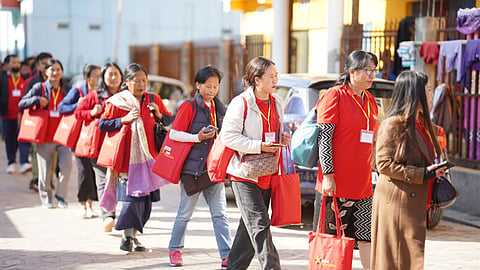

GUWAHATI: Amid the dark clouds of ethnic conflict in Manipur, there is some glimmer of hope for schoolteachers and students.
The state education department’s collaboration with NewGlobe, an international education support organisation which has its presence in several countries, has brought up creative new ways of teaching to make learning more interesting.
The two joined hands in 2020 for the ‘System Transformation and Rejuvenation of Education’ or STAR Education to create globally competitive government schools through the transformation of teaching and learning that could produce giant learning gains.
Under School Fagathansi Mission’s STAR Education programme, high school teachers from various districts underwent training recently. Another 253 underwent the training last year. The teachers were provided with a tablet that showed them new approaches to teaching even seemingly boring subjects and marked their attendance.
Heshu Martina, who teaches at the Tobumai Junior High School in Senapati, said she got a new idea to teach science with a fresh perspective with the help of the tech tool.
“The tab guides me on how I should approach the subject, turning it into an interesting session for the children,” she said.
“The lesson plans, incorporated in the tab, have made the class easier. Many of us did not know how to make our lesson plans despite having a degree in bachelor of education. They prepare the lessons based on the curriculum and we need to sync it online. I am sure it will maximise students’ learning,” Martina said.
Usham Ningthoukhomba, who teaches English at the Netaji Subhash Chandra Bose Awasiya Vidyalaya in Imphal East district, said the introduction of technology made the training unique.
“STAR Education provided us with technology-based readymade lesson plans. They monitor teachers’ performance and motivate them. Now, we don’t have to waste our time in making lesson plans as everything is explained in the system. It has decreased our workload,” he said.
Both teachers said the introduction of “Cheers and Energisers” was helping them avoid distraction in the classroom. To remove fatigue, teachers and students shout out in unison along with physical actions.
Sujatha Muthayya, Vice President, Asia, Policy & Partnership, NewGlobe, said these intensive training sessions are specifically designed to equip government teachers with the tools, technology, and techniques needed to expedite students’ learning outcomes.
“We provide training and continued support throughout the programme to ensure that all educators possess the essential skills and pedagogy required for effective teaching and classroom management. The trainings are grounded in the science of learning and shaped by scientifically tested insights gleaned over a decade,” she said.
She said they rigorously test instructional practices that produce learning gains to create a comprehensive training module that can be implemented at a systemic level. This process allows them to translate scientific findings to cater to the nuances of the government school system.
Under the programme, children are baselined and the ability of teachers is gauged to know the status of teaching and learning. This process is followed by local contextualization.
“Our training and support leverage technology-enabled data to implement scientific instructional practices with high fidelity. We had a first cohort of teachers trained from 253 schools. From that, we trained, supported and handheld 1,800 teachers. We started with 16,000 children and as a result of our intervention, the schools enrolled an additional 9,000 children,” Muthayya said.
Sonny Chungkham, Director of Policy and Partnerships at STAR Education, said a lot of the children do not have basic foundational skills. He was hopeful the programme would be expanded to primary and elementary schools.
Sandeep Kumar, director of the leadership and development department, said 360-degree support is given to headmasters, schools and the community.
“We conduct 10-day in-person induction training. We have trainers who also undergo training. They train teachers and headmasters. We observe and monitor them and keep giving them feedback to improve,” he said.
The state’s education minister T Basantakumar Singh said the STAR Education programme, a key initiative of Chief Minister N Biren Singh’s School Fagathansi Mission, stands out as a transformative initiative.
“The trainings underscore a shared commitment of Manipur government and STAR Education to elevate the standard of education across our government schools,” he said.
Sucheta Khumukcham, who is the Zonal Education Officer of Imphal West district, said the training has many positives.
“As teachers acquire new skills and knowledge, they become more assured in their teaching capabilities. They can now handle diverse classroom situations effectively and create a positive and engaging learning environment. Teachers provide students with more autonomy and control over their learning,” she said.
According to a Midline Survey conducted last year, schools under the programme experienced an almost four times acceleration in fluency outcomes. Numeracy skills increased by 8%, surpassing schools not utilising STAR Education teaching methodology. Moreover, enrollment in schools under the programme increased by 45%.